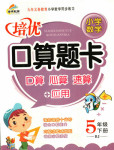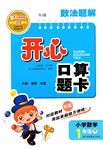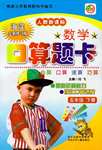题目内容
The nurse whose name is Mary assisted me ______ the operation they day before yesterday.
| A.perform | B.to performing | C.on performing | D.in performing |
D
解析

 培优口算题卡系列答案
培优口算题卡系列答案 开心口算题卡系列答案
开心口算题卡系列答案 口算题卡河北少年儿童出版社系列答案
口算题卡河北少年儿童出版社系列答案When a first-time father saw his newborn son, he immediately noticed the baby's ears obviously standing out from his head. He expressed his concern to the nurse that some children might tease his child. A doctor examined the baby and reassured the new dad that his son was healthy- the ears presented only a minor problem with its appearance.
But the nervous father persisted. He wondered if the child might suffer psychological effects of ridicule, or if they should consider plastic surgery. The nurse assured him that it was really no problem, and he should just wait to see if the boy grows into his ears.
The father finally felt more optimistic about his child, but now he worried about his wife's reaction to those large ears. She had been delivered by operation, and had not yet seen the child.
“She doesn't take things as easily as I do,” he said to the nurse.
By this time, the new mother was settled in the recovery room and ready to meet her new baby. The nurse went along with the dad to lend some support in case this inexperienced mother became upset about her baby's large ears.
The baby was in a receiving blanket with his head covered for the short trip through the cold air-conditioned corridor. The baby was placed in his mother's arms, who eased the blanket back so that she could look at her child for the first time.
She took one look at her baby's face and looked to her husband and gasped, “Oh, Honey! Look! He has your ears!”
No problem with Mom. She married those ears...and she loves the man to whom they are attached.
The poet Kahlil Gibran said, “Beauty is not in the face; beauty is a light in the heart.” It's hard to see the ears when you're looking into the light.
1.When the father first saw his baby, he was worried that________.
A. The baby might not grow up healthily
B. The baby might be laughed at by others.
C. The baby might disappoint its mother
D. the baby might have mental problems.
2.According to the doctor and nurse, the baby’s ears________.
A. could not function well. B. looked the same as others.
C. only caused a small problem. D. needed to have plastic surgery.
3. What is true about the baby’s mother?
A. She blamed her husband for the baby’s big ears.
B. She was the first to discover the baby’s large ears.
C. She suggested having an operation on the baby immediately.
D. She found something similar between the baby and its father.
4. What does the underlined word they refer to?
A. The ears. B. The parents
C. The doctor and nurse. D. The problems
5. What’s the function of the last paragraph?
A. To advise readers to listen carefully.
B. To draw a conclusion from the story.
C. To criticize the wrong attitude to physical beauty.
D. To stress the importance of doctor-patient relationship.
I believe ___36__ is a powerful(强效的) medicine.
It was Sunday. I had the last __37__ to see and I get into her room. She was an old woman, sitting on the bed, trying to ____38__ her socks. Usually I said something like this: “How are you feeling? The nurse says your _39__ is visiting you today. I believe you are __40__ him.
She ___41___ with a serious voice, “ Sit down, doctor. This is my story, not yours.” I was surprised and ___42___. I sat down and helped her with the ___43__. She began to tell me that her only son lived not far away from her, ___44___ she had not seen him for five years. She believed her ___45__ problems were worse because of ___46__ her son. After hearing her story and helping her put on her socks, I asked if there was ____47___ I could do for her. She __48__ her head and smiled. All she wanted me to do was to __49__.
Each story is ___50__. Some are clear; others are not. Some are true; others are not, yet all those things do not __51_. What matters to the storyteller is that the story is heard.
Listening to someone’s story costs ___52___ but it is the key to healing(康复). I often ____53__ what the woman taught me, and I ____54__ myself of the importance of stopping, sitting down and truly listening. I __55___ the power of listening.
|
1. |
|
|
2. |
|
|
3. |
|
|
4. |
|
|
5. |
|
|
6. |
|
|
7. |
|
|
8. |
|
|
9. |
|
|
10. |
|
|
11. |
|
|
12. |
|
|
13. |
|
|
14. |
|
|
15. |
|
|
16. |
|
|
17. |
|
|
18. |
|
|
19. |
|
|
20. |
|
Everybody may have seen the film “Death on the Nile ( 尼罗河)”, but nobody can imagine that the writer of the story, Agatha Christie, saved a baby in a most unusual way.
In June 1977, a baby girl became seriously ill in Deleville. Doctors there were unable to find out the cause of her illness, so she was sent to a famous hospital in London, where there were many excellent doctors. The baby was so seriously ill that a team of doctors hurried to examine her without delay. The doctors, too, were puzzled by the baby’s illness and they also became discouraged. Just then a nurse asked to speak to them.
“I think the baby is suffering from thallium (铊) poisoning. ” said the nurse. “A few days ago, I read a story ‘A Pale Horse’ written by Agatha Christie. Someone uses thallium poison, and all the symptoms (症状) are written in the book. They are exactly the same as the baby’s.”
“You’re very good at observing things,” said a doctor, “and you may be right. We’ll carry out some tests and find out whether the cause is thallium poisoning or not.”
The tests proved that the baby had indeed been poisoned by thallium. Once they knew the cause, the doctors were able to give her correct treatment. The baby soon got well and was sent back to Deleville. A week later it was reported that the poison might have come from an insecticide (杀虫剂) used in Deleville.
1.The baby was sent to a hospital in London because ______.
|
A.her parents were living in London then |
|
B.the hospitals in Deleville were full at that time |
|
C.doctors in Deleville were not sure about the cause of her illness |
|
D.she was the daughter of a famous doctor in London |
2.When the baby was first sent to the hospital in London, her illness was considered to be ______
A quite easy to treat
B. the result of thallium poisoning
C. a common one
D. extraordinarily serious
3.From this passage it seems that the baby’s illness had something to do with ______.
A a dead writer B. a harmful substance ( 物质) used to kill pests
C. the water in Deleville D. a dangerous murderer
4. As far as we can tell from the story, Agatha Christie ______.
|
A.had never met this baby |
|
B.had spent a long time studying the baby’s illness |
|
C.visited the baby both in Deleville and London |
|
D.gave the nurse some advice on the telephone |
